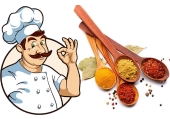





 9
9





![Filename: Salt_info.jpg
Description: [Thumbnail for Salt_info.jpg]](/t/236533/a/229828/Salt_info.jpg)
 7
7




“It’s said war—war never changes. Men do, through the roads they walk. And this road—has reached its end.”
 5
5




I do Celtic, fantasy, folk and shanty singing at Renaissance faires, fantasy festivals, pirate campouts, and other events in OR and WA, USA.
RionaTheSinger on youtube
 4
4




Jordan Holland wrote: I would point out that I also feel the official position on blood pressure is just as erroneous as the official position on reducing salt as much as possible. !
 1
1
 1
1




With appropriate microbes, minerals and organic matter, there is no need for pesticides or herbicides.

 2
2




 2
2




Invasive plants are Earth's way of insisting we notice her medicines. Stephen Herrod Buhner
Everyone learns what works by learning what doesn't work. Stephen Herrod Buhner




Eino Kenttä wrote:My mother had a stroke a bunch of years back. After surgery, she was prescribed salt pills (yes, just plain salt in pill form). Apparently, that's standard practice after any damage involving the brain, as more salt is needed during healing. Also, after the stroke, she started craving salt, which she never did before, so I suppose her body proved the doctors right in this case. Interestingly, young kids often love salt. I wonder if it's because they need it to develop their brain?




Anne Miller wrote:Helena, welcome to the forum!
You have brought up some really good points.
I quit using salt years ago so I have not paid a lot of attention to salt.
I recently added salt back into my diet because salt makes the food taste much more interesting.
We have both sea salt and pink salt.
Is one better than the other?
For anyone that might be interested in harvesting their own salt this thread is for you:
https://permies.com/t/85170/Waynes-solar-salt-factory
 2
2




Helena Green wrote:.... In my training and experience, however, cutting out salt altogether can create health problems of its own.
“The most important decision we make is whether we believe we live in a friendly or hostile universe.”― Albert Einstein

 3
3




The 'averaging' of data from medicine suggests that we have not....and that sodium levels above a certain amount are highly associated with cardiovascular problems.
“It’s said war—war never changes. Men do, through the roads they walk. And this road—has reached its end.”

 5
5




 4
4




Jordan Holland wrote:.....It looks like in 2017 the AMA decided to lower the number of what they consider hypertensive to 130/80. Why lower them? Of course they will say more research. That must mean they were wrong before then, right? How do we know they are right now if they were wrong only a few years ago? I think it has been reasonably demonstrated that elevated blood pressures for extended periods can cause organ damage and cardiovascular issues. But I think the main issue is that modern medicine wants to view virtually everything, hypertension included, as a disease when it is actually a symptom. So we end up with a system that treats the symptoms rather than the actual cause.....
Eino Kenttä wrote:...I wonder, for instance, if the ratio of sodium versus potassium intake could affect the outcome? Nerve cells (and some other cell types) use Na+ and K+ ions in tandem to generate action potentials....
“The most important decision we make is whether we believe we live in a friendly or hostile universe.”― Albert Einstein

|
BWA HA HA HA HA HA HA! Tiny ad:
Freaky Cheap Heat - 2 hour movie - HD streaming
https://permies.com/wiki/238453/Freaky-Cheap-Heat-hour-movie
|




